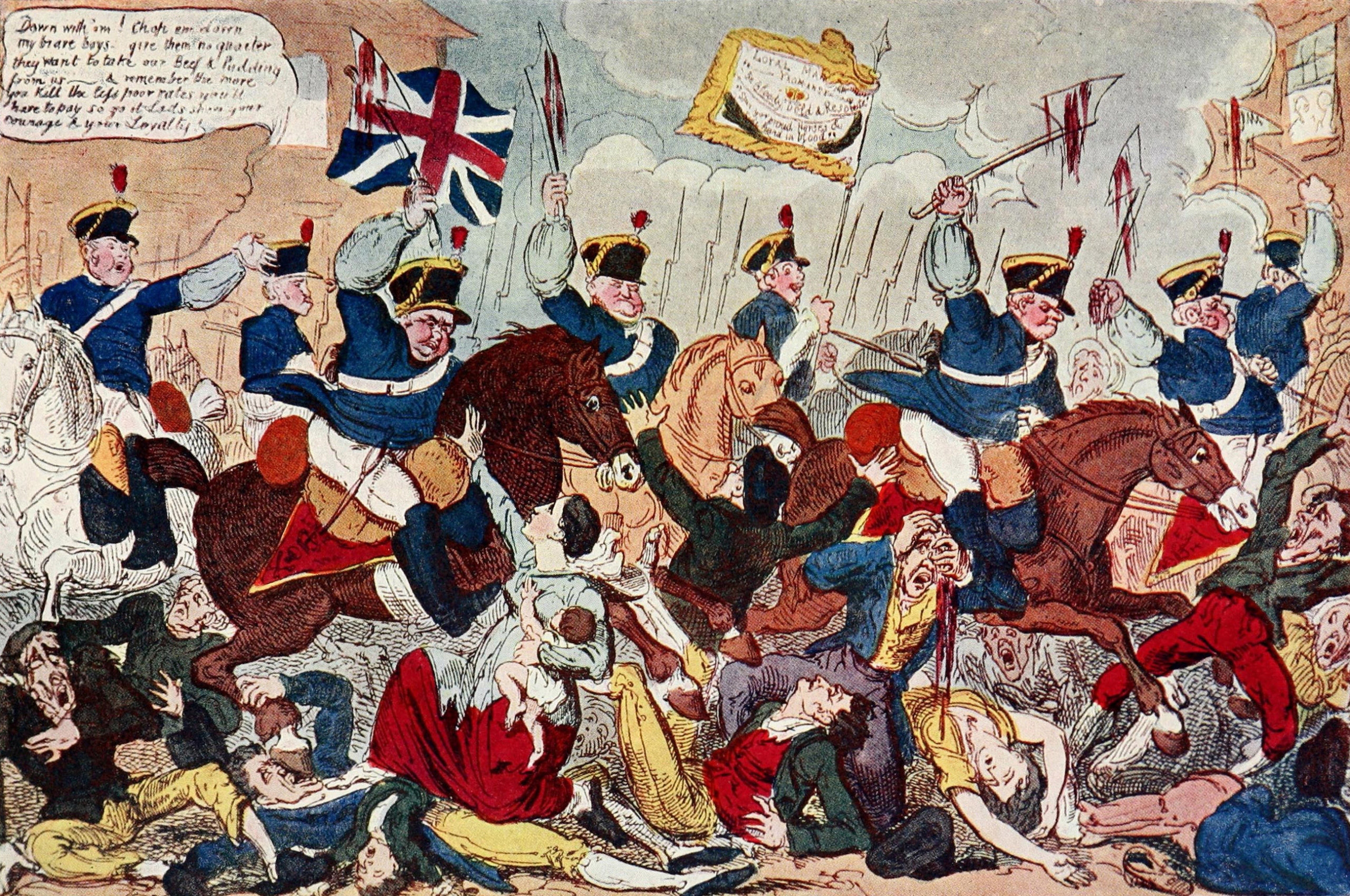In this blog, Ciarán O’Donohue a PhD student in the Department of History, Classics and Archaeology, discusses the decision to teach mathematics to the first students of the Mechanics Institute. This is part of the 200th anniversary blog series that celebrates the College’s bicentenary in 2023.

The Massacre of Peterloo. The commander is saying “Down with ’em! Chop ’em down my brave boys; give them no quarter! They want to take our Beef & Pudding from us – & remember the more you kill the less poor rates you’ll have to pay so go on Lads show your courage & your Loyalty!”
Many of us will be familiar with the common questioning of why certain concepts are taught in our schools. Mathematics, and especially its most intricate systems, are often first to face the firing squad. It is not unusual to hear someone discussing education to ask: “Why are we not taught about credit, loans, and tax? I’m never going to use Pythagoras’s Theorem!” Certainly, when the subject of mathematics is brought up, the utility of algebra and theorems are often jovially dismissed as unimportant.
Two centuries ago, the picture was very different. The question of whether mathematics would be useful or dangerous knowledge to teach to the working class was one that was debated extremely seriously. In November 1823, the same month that the London Mechanics’ Institution was founded (which has now come to be named Birkbeck, University of London), Bell’s Weekly Messenger seized upon the propriety of teaching maths to London’s lower orders, lamenting that “the unhappy scepticism in France has been justly ascribed to this cause.” The implication was that teaching maths to the wider populace had caused them to question the order of society, and directly contributed to the French Revolution and its aftermath. Pertinently, this was an order which the British government had spent a fortune, not to mention the lives of hundreds of thousands of British subjects in the Napoleonic Wars to restore.
A revolution in Britain itself was still palpably feared in the 1820s, and its spectre was made more haunting by the Peterloo massacre just four years before this particular article was written, in August 1819. And so, surrounding the foundation of our College, and which subjects were appropriate, a war of words was waged.
The idea of teaching London’s working classes mathematics filled many with visceral dread. It was believed this would cause them to also become questioning like France’s peasants, eventually seeking proof for statements which they had hitherto blindly accepted.
The teaching of mathematics to mechanics, then, was considered by many to be socially, politically, and morally dangerous. Not only might it turn them into a questioning multitude, unwilling to simply accept what they’re told, it might also make them question the very structure of society and push for a semblance of equality. For critics, both outcomes could readily lead to revolution.
Henry Brougham, one of the founders of the College, believed that this catastrophe could be averted by teaching a reified body of knowledge, including a simplified version of mathematics. Writing of geometry, Brougham argued that, rather than “go through the whole steps of that beautiful system, by which the most general and remote truths are connected with the few simple definitions and axioms” it would be sufficient (and indeed safer) if the masses were to learn only the practical operations and general utility of geometry.
Similarly, many religious supporters of extending mathematical education to the mechanics believed that it would make people more religious, not less, if only it were taught in the right way. As God was believed to have created the world, the logic and order inherent in mathematic systems was held to show traces of his hand at work. An appreciation of mathematics and its traceable, systematic connections would thus create a renewed appreciation of God; not to mention for the order of the world as divinely ordained.
Likewise, moralists perceived more benefits in teaching the mechanics mathematics than drawbacks. The issue for them was not if the mechanics were to learn or read, but rather what. The key issue was that the mechanics were already largely literate. The rise of cheap literature, especially of the sentimental and pornographic varieties, preoccupied the minds of moralists and industrialists.
As the lower orders were believed to be motivated primarily by sensuality, learning mathematics was presented as a salve to degeneracy; a way to occupy their time with higher minded pursuits and strengthen their characters against wanton immorality.
Perhaps most worrying was the growing and uncontrollable availability of radical political writings. This more than anything was likely to upset the current order of society. The perceived and highly theoretical disadvantages of a mathematical education were thus infinitely preferable to such a realistic and allegedly growing threat. It was believed that the teaching of mathematics and science through a dedicated course of study, being undertaken as in the evenings, might reduce the time and energy the working man would have to devote to reading political tracts, let alone political activism.
It is, however, worth noting that, although many mechanics were literate, and most had rudimentary mathematical skills, the wider debate was far removed from the reality. Many mechanics required far more elementary lessons in mathematics before the advanced classes could even be attempted. Although mathematics and science initially formed the centre of the curriculum at Birkbeck in the 1820s, by 1830 the reality of need had been discovered: advanced classes had been removed altogether, and instruction in elementary arithmetic was given to vast numbers of members. This was to continue to be the reality for much of the next 30 years.
How far, then, the raging debates about the inclusion of mathematics in the curricula of new centres for working-class education impacted the trajectory, is still a topic for debate.
Further information:
